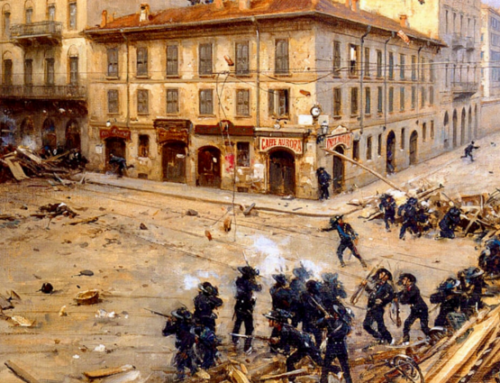As we continue to approach the November elections, political ideas (mostly incoherent and ephemeral) whiz by us at speeds beyond comprehension. The internet has helped encourage this speeding up process, but it has also allowed many of us to find some breathing space, a haven of sorts in which we can digest the ideas, find a better vocabulary and line of reasoning, and re-emerge in the whiz-bang debates armed with better information (at least this has been the case for me). Unfortunately, by the time we come back from our brief haven, the political debates have moved on to something else entirely, and the question we originally needed space from has already been solidified into some kind of temporary orthodoxy, the issue having exhausted the patience of a restless public.
What are the real debates about? The media, not surprisingly, focuses on the most trivial of things, especially on the slips of the tongue and poorly-worded but honest answers given by the just if overly earnest of those running for office.
If there was ever a time in our history that called for a re-examination of the First Principles of the western tradition, it is now. As I’ve mentioned before on The Imaginative Conservative, I’m not entirely sure that our republic is going to weather this current storm. Even the election of a Republican will probably only allow for a holding action rather than a reverse toward what is most needed. And, my guess is that a Republican administration will keep civil liberties in their decayed state (Mr. Obama, from his track record, at least, would encourage their erosion even further), but it will also expand America’s military presence in the world. Thus, no one who believes in liberty will really gain from this election. Our votes will either help slow the decay of civil liberties or advance them more quickly.
In 1776, just before he departed on a diplomatic mission for Canada, Charles Carroll of Carrollton made a call for a complete reform and purification of the colonial governments. The English, he noted in concert with many Americans, had become corrupt beyond redemption. But the colonists had built civilizations out of the wilderness, armed with the Judeo-Christian tradition of ethics and morality, the Greek and Roman understandings of the mind and the commonwealth, and the English common law. Now, he argued, it was time to reform and purify what had been inherited, to take the country back to its dearest principles, possessed not by Americans alone, but by all women and men of good will.
Those principles shine forth, of course, in the founding documents: the ultimate dignity of the human person (in the Declaration and Northwest Ordinance, the words called for a universal understanding of such dignity, even if the practices of the time did not); the right to live in community and associate the right to practice religion freely the right to educate our children; and the right to defend ourselves against the arbtrary will of man.
It’s impossible to understand how an American people built upon such foundations can allow for the growth of empire, the murder of innocents abroad by drones, the permanent internment of Americans without trial, the groping of citizens in the airports.
Yes, we need to think about parties and elections. We need to follow the debates. But, we also need action, protest, assembly, and demonstration. It’s not enough to wave around our Cato or Heritage copies of the constitution. It’s time to live the constitution and defend it with all the power given us by He who makes, blesses, and sanctifies all things, He who will bring all things back to right order.
Books on the topic discussed in this essay may be found in The Imaginative Conservative Bookstore.








Unfortunately, I think even the Constitution indicates that at the very least Congress has the power to suspend habeas corpus. I understand your concern, don't get me wrong. On the other hand, I think the Republic is much stronger than you think, or at least your post indicates. Even prisoners in Guantanamo have access to the courts in order to contest their designation as "enemy combatants." Also I would take issue with the term "empire" as you use it here. Was it pursuit of "empire" that forced the United States to stand up to the Soviet Union during the Cold War? I hardly see how the situation is any different today, especially in a globalized world. One can hardly get away with burying one's head in the sand any longer. And as for innocents killed during wartime – do you believe in a just war? Even St. Augustine believed that innocents could be lawfully killed in such a war, so long as the customary laws of war were followed. Please don't misunderstand me, this is a tragedy we are discussing, especially with regards to the killing of innocents. Yet nonetheless, the alternatives to a just war may ultimately be much worse…
Very interesting, Brad. It reminds me of a statement in another context I read long ago by J.I. Packer, I think in his book "Knowing God." He said we might be surprised how much of a person's theology is determined by their personality, rather than, well, anything else. Some people are by nature naturally more pessimistic, others more optimistic. Back in the 1950s, as I'm sure you know, Whittaker Chambers was convinced the West was a lost cause in its societal struggle against communism. As we know, he was wrong. I think it's safe to say he was a pessimist by nature. Ronald Reagan, needless to say, wasn't. I remember like it was yesterday his "tear down this wall" speech. Poor Ronnie just doesn't get it; The Wall is eternal. Boy was I and most everyone else really wrong.
I think there are quite a number of folks on the right who fall in the pessimist camp, those who are not sure, like you, that we will weather this storm, or who are convinced we won’t. I happened to be convinced we will weather this storm, and in due course come out on the other side more strongly for it. The pessimists on the right often forget that we have the government we have to a large degree because of the culture we have. The statists have infiltrated every organ of cultural influence over the last half century, while those who believe in the Constitution and limited government fought political battles. Until our education, media and entertainment reflect more of the latter than the former, we’ll fight uphill battles to limit Leviathan. An increasing number of people on the right get this.
I also see a much larger distinction between The D and the R parties. But even if my Ron Paulian friends are right, and that it’s a distinction without a difference, or a minimal difference as you seem to believe, the friends of liberty and America’s Founding principals have absolutely no sway on a Democrat Party. I remember Ronald Reagan fighting the country club moderate type Republicans who controlled the party of Gerald Ford. They despised Reagan and his conservatism. We forget how much the Republican Party has changed, even if it hasn’t changed enough for many of us.
I’m grateful Reagan didn’t decide to go third party, like some Ron Paul supporters seem inclined to do. I often wonder when talking to these people, why hasn’t Rep. Paul gone third party? Why is his son a United States Senator with an (R) next to his name? It is only within the Republican Party that we will have sway and the ability to influence policy and ideas. Third party champions are making a terrible mistake, especially if it gives us four more years of . . . . I can’t bear to even think it. Of course we must wage a cultural battle as well, and take back some of the influence the left almost monolithically now enjoys. Ours is a generational battle, and the country and world we leave to our children and grand children depend on it.
Nice article. I especially appreciate the paragraph about empire, drones etc. If you ask me, not only is US imperialism/militarism immoral, but it's also why the economy is failing. To me, the absence of this topic from the presidential debates demonstrates that the elections are a farce. We have two wings of the same Establishment party, owned by the military-industrial-oil-banking-media-AIPAC complex, serving only to distract public attention from the real issues.
I would add that I by no means see the current military actions in Afghanistan, Pakistan and Yemen as conforming with 'just war' principles. One of the most basic requirements of a just war is a full and open debate on the necessity and wisdom of the action. But there is no debate or discussion. The wars are 'justified' only by vague and unproven appeals to "anti-terrorism." Yet my own Senator (Barbara Boxer) informs me by letter that our goal in Afghanistan is not counter-terrorism, but "geopolitical" (whatever that means; I doubt even she knows).
It won't matter which candidate wins. I'm satisfied to vote for the Libertarian, Gary Johnson. I don't see that as a wasted vote: if Romney were to lose by a margin comparable to the proportion of votes Johnson receives, it will pressure the Republicans to be more realistic next election. And every vote Johnson gets is a vote against militarism.
So, seeing this essentially as a staged election to pacify and distract the masses, I don't need to follow the debates, and can devote my attention to more important matters.
Brad "sees". He sees not only the tree and its neighboring tree community, but the bark on a tree and the fruit it bears. Brad sees the multi-layered generational effect that apathy and individualism has had on a country that was first established to bind different people together under a common good. That good was transcendent and led to millions of people entering this country to find hope.
And I disagree that we are not fighting the Marxist idea anymore. I just enrolled my children in the public school system this year. Believe me, it is alive and well.
If you read Brad's writings you will find a very hopeful man that finds joy in things most people no longer have the vision to see. Just because a man speaks logically concerning the reality in which he lives, does not make him pessimistic. We would then have to label George Washington and even Jesus a pessimist.
MasterMax, I appreciate your perspective. I know Brad and he's a fantastic, positive, affirming, wonderful guy. That wasn't my point. One can "see" and see very clearly, and come to different conclusions. I couldn't agree more with most everything he says, but I simply assess the threats a bit differently. I am more hopeful than he seems to be. That's it.
I didn't say we weren't fighting Marxist ideas anymore (the Democrat party and most of those cultural influence professions I mentioned are dominated by progressives, Marx's progeny), only that what seemed eternal, the Soviet Union, is no more, and it took a man of positive vision, a many who believed in the ultimate superiority of Western virtues and values, and the American people, to lead a world to that outcome. This is most definitely not a staged election, and I hope many who have a third party temptation will resist it.